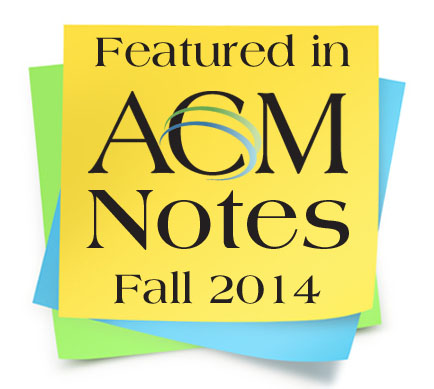How can faculty at ACM colleges take advantage of digital technologies and online tools to enrich their students’ learning while remaining true to the core strengths of the residential, liberal arts model? What innovative pedagogical approaches are already being used and what have been the results? How can faculty and instructional technologists most effectively work together?
These are some of the questions that will be addressed at Technology-Enabled Education: Enhancing Faculty & Student Engagement in the Liberal Arts College, a conference sponsored by the ACM FaCE program in Chicago on October 17 – 19, 2014.
This will be the opening event for the third phase of the Faculty Career Enhancement (FaCE) Program, which is funded by a $2 million grant awarded to ACM by The Andrew W. Mellon Foundation.
|
|
FaCE recently issued a Request for Proposals for the first cycle of funding for innovative, collaborative projects by ACM college faculty and staff engaged in technology and teaching and learning. Technology-enabled education is the theme for both the conference and the 2014-15 fall and spring funding cycles, and the conference is designed to serve as an incubator for developing ideas for projects. Participants at the conference – two faculty members and an instructional technologist from each ACM college – are being nominated by their academic deans.
“At the conference, we’ll start by trying to prompt discussion about technology-enabled education, beginning with our pair of keynote speakers who have been active in efforts at the national level,” said Brian Williams, ACM Vice President and Director of Faculty Development and Grant-Funded Programs. “From there, the conference sessions will dive into the nuts and bolts of doing this work on ACM campuses. How can we take the best of what ACM faculty already do in the classroom and the best of what instructional technology and online tools have to offer, and from that create something that leads to better teaching and learning?”
“The second main goal for the conference is that by bringing people together, we hope to engage participants in conversations that result in proposals that can be funded through the FaCE grant,” he said. “One part of that will be to talk about what we’re looking for [in a proposal] and how you can craft an effective proposal.”
Bryn Mawr College President Kimberly Cassidy and Candace Thille, who is Assistant Professor in the Graduate School of Education at Stanford University and Director of the Open Learning Initiative (OLI) at Carnegie Mellon University, will give the keynote presentations.
The conference will also tap the expertise and experience of faculty and technologists at ACM colleges who have been involved in various forms of technology-enabled education, from blended learning modules to “flipped” classrooms to fully online courses.
Among the presenters will be mathematicians Chad Topaz (Macalester College) and Kristina Garrett (St. Olaf College), who collaborated to develop and teach ACM’s pilot online course in applied calculus.
Still in the planning stages is a series of interactive sessions that will enable conference participants to share knowledge, make connections with colleagues on other campuses, and spark ideas for collaborative projects that can be developed into proposals for FaCE funding.
More details about the sessions will be available on the Technology-Enabled Education conference webpage as presenters and participants are set.
Links:
- FaCE Conference on Technology-Enabled Education
- Request for Proposals – FaCE fall 2014 funding cycle
- Faculty Career Enhancement (FaCE) Program
- ACM Online Learning Project
- The Andrew W. Mellon Foundation









